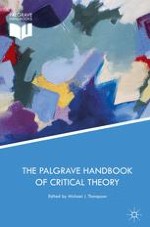2017 | OriginalPaper | Chapter
20. The Social Psychology of Critical Theory
Author : Lauren Langman
Published in: The Palgrave Handbook of Critical Theory
Publisher: Palgrave Macmillan US
Activate our intelligent search to find suitable subject content or patents.
Select sections of text to find matching patents with Artificial Intelligence. powered by
Select sections of text to find additional relevant content using AI-assisted search. powered by
